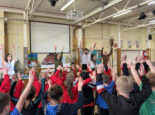Reading frenzy!

This summer, Peterborough’s libraries once again took part in the Summer Reading Challenge, the UK’s leading reading-for-pleasure programme for primary-aged children. They also ran – for the first time in Peterborough – the ImagiNation Challenge series of arts and reading workshops aimed at 11-16 year olds, plus a plethora of associated events, including a huge book giveaway. The City Read was the biggest ever reading initiative for young people in the city, and hugely popular – but there was a serious purpose behind the fun. So, how did it go, and what did it achieve? We talked to Elaine Wilkinson and Peter Aldridge, Events & Programme Officers for Vivacity Libraries
How did the national Summer Reading Challenge come about?
Elaine: It was started by the Reading Agency in 1999 to encourage children to read during the summer holidays and become avid readers for pleasure.
How was that project brought to Peterborough?
Pete: Ninety-eight per cent of UK library authorities now take part, and this is something we can’t miss – we could not produce an initiative of this quality and scope on our own. Children and parents across the country now look forward to it every summer and it’s become a permanent fixture in the Peterborough Libraries calendar.
Was this in response to a perceived need?
Pete: Research has shown that children’s reading levels dip during the summer holidays if they don’t keep reading, so this aims to prevent the dip and indeed improve children’s reading. We’ve had reports from parents in Peterborough saying that their children’s reading levels have significantly gone up after taking part in the reading challenge.
Why is reading so important?
Elaine: It’s essential to success in life – a recent campaign ‘Read On, Get On’ has shown that: ‘young children who enjoy reading independently will have had the door opened to new discoveries and wide interests, to knowledge, creativity and confidence. Reading is the critical route to other subjects as well as a provider of wider opportunities for giving more and getting more from life and work.’ [quote from Save the Children]
Peterborough has some challenges with the ranking of its schools – can schemes such as this actually help raise the standard of education in the city?
Elaine: One in six people in the UK struggle with literacy. Peterborough data also shows that reading and writing levels are below the national average at reception and Key Stage 2 in our primary schools. So anything like this will help improve children’s reading levels. As already mentioned, reading opens the door to doing better at school and improving life chances. It’s also worth mentioning the Bookstart Scheme here, which Peterborough takes part in. This is a national scheme run by Book Trust, where every child under the age of five receives free books, one pack just after birth and another when they turn three. We work with Health Visitors, Early Years Settings and Childminders to make sure all Peterborough children receive these packs, and we make sure the message gets out to parents that it’s never too early to start sharing stories with your child. Children who are read to before they go to school are likely to do much better than those who aren’t, and of course it’s a great experience sharing stories together with your baby or toddler.
Of course it’s fun too… Is that the key – just making it enjoyable?
Pete: Very much so, it needs to be fun to encourage the children to sign up and finish the challenge. Children really enjoy collecting the giveaways – stickers, bookmarks, key rings and wristbands, and have a certificate presented to them at school if they finish. The Reading Agency comes up with some great themes each year – this year’s Mythical Maze theme went down really well. Previous years have included Creepy House, Reading Rollercoaster, Big Wild Read and much more! They can go online for more themed fun and this year there was even an app which brought characters to life.
Do you feel it has been a success so far?
Pete: Definitely – we’re finding that each year the numbers taking part increase, and this year a larger percentage of children actually finished six books so we’re delighted with that. The primary schools across the city are very much behind the initiative and they encourage the children to sign up, which is a great help to us as they will promote it to the families using their school.
Mythical Maze had 1,886 starters and 1,274 finishers this year – were you happy with that number?
Pete: This was a record for us, so we’re really pleased and hope the momentum continues next year. Watch out for details of the 2015 challenge!
ImagiNation is a smaller project: 150 starters, 64 finishers. Is it a different set of challenges for older children?
Pete: This is the first year ImagiNation has run, and it was targeted at older children and teenagers. They could choose four books to read and review, and an exciting element was the inclusion of an art project – they could upload their own artwork inspired by books onto a regional blog. As part of this project we also ran workshops with professional artists which were sold out and which the young people really enjoyed. The art forms ranged from graffiti to digital art, all inspired by books.
Is the Graphic Novel Project a good way in for kids who may be less inclined to dive straight into a purely text-based novel?
Elaine: In some case yes, it has a broad appeal to those who read avidly and those who are less inclined to do so. Comics are a hugely accessible artform, but their visual language is very complex. As well as designing the images and layout the young people learnt about language, character, setting and story structure so art and writing were brilliantly combined.
How much does it all depend on support from parents?
Elaine: This is key to getting children into the library and engaged with the service. Particularly for younger children who need to be accompanied. Parents who read too are also a good role model. Parents who share stories with younger children are a powerful factor in getting the reading habit – and indeed grandparents and other adults who may be part of the children’s lives can be key.
Do you think that digital media – games, phones etc – have had an effect on reading, or the way kids read?
Elaine: There’s no getting away from the fact that technology is now a central part of many young people’s lives. Games and social media are competing for leisure time.
Can they be used to encourage reading..?
Elaine: I think so, we do now provide an eBook lending service and now have a kids and teens section, so we’re hoping that young people will download eBooks to their smart phones or tablets and carry on reading that way.
Do you have any stories of individual success or achievement amongst this year’s young readers?
Pete: We had this lovely feedback from a parent: ‘My son enjoyed completing the challenge and read all 6 lengthy books in 2 weeks. He has become more independent with using the library; selecting books, booking them out and even making enquiries. I have seen a big change in his maturity as he has become more confident.’ Another parent told us that the summer reading challenge had brought the family back to the library.
How do parents (and children themselves) keep up the momentum once they’ve got the reading bug?
Pete: We run a lot of events and activities to keep children engaged with reading. Nearly all our libraries run regular children’s reading groups, and we have half term and holiday activities at many of the libraries. Our free weekly storytimes and baby rhymetimes are always well attended by families. We also have children’s authors visit the city and talk to groups of children from local schools. And don’t forget we’re constantly adding books for all interests and ages to our library stock, so there will always be something new for everyone.
Are you looking to expand or add additional activities in future? Are there other things you would like to do?
Elaine: Peterborough has just been designated a Literacy Hub – which brings together different organisations to boost literacy in the city. We’re looking forward to lots of new opportunities to work with established and new partners to achieve this. We’ve just been part of a literacy event at Central Park and will be storytelling on a bus in November, and that’s just the start! We trialled our first City Read this summer, where 800 copies of Stay Where You Are and Then Leave by John Boyne (author of The Boy in the Striped Pyjamas) were given away to children and adults in Peterborough. This was very well received and we’re aiming to run this again for at least the next two years, working with partner organisations. We were originally planning a programme with 400 books, but thanks to generous sponsorship from BGL Group we were able to double the number of books handed out to schools and members of the public. On average 2-3 people read each book. So that’s 2,000 people sharing the joy of reading. We’ve also just launched Vivacity for Schools, a project that brings together all the learning opportunities Vivacity offers to school-age children across all our different services. It makes it even easier for teacher and schools to take advantage of these opportunities for their students.
What, ultimately, would you like these ongoing projects to achieve?
Elaine: We want Peterborough to be a city that has a buzz about reading!
For more information on library events and services drop into your local library, or visit www.vivacity-peterborough.com/libraries. To find out about what Vivacity can offer for schools, visit www.vivacity-peterborough.com/learning















